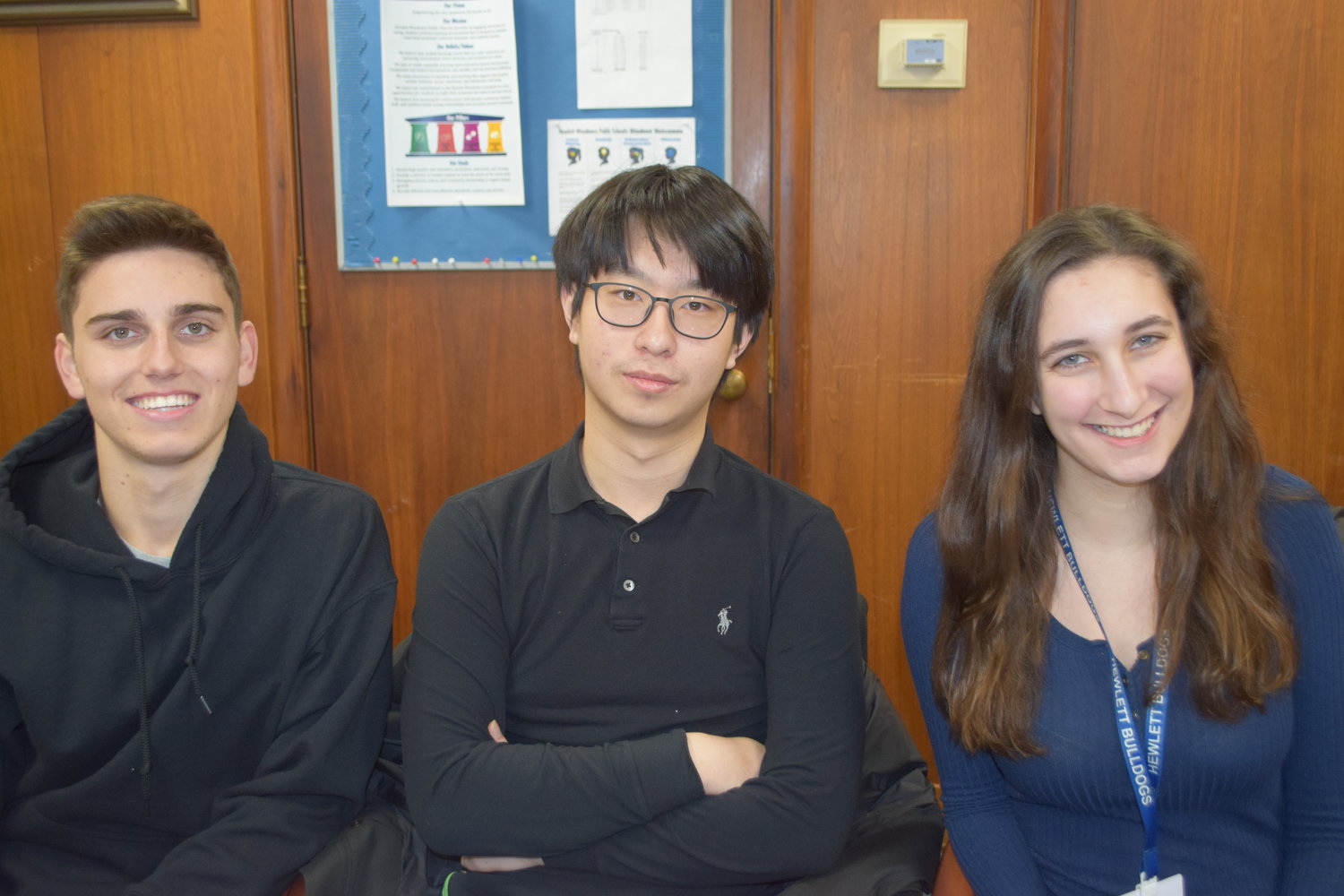Doing science right at Hewlett High School
Three seniors are Regeneron semifinalists
Jan. 23 can’t come fast enough for Hewlett High School seniors Samuel Bogdanov, Julia Grossman and Siyuan Yue, because that’s when the 2019 Regeneron Science Talent Search semifinalists will learn if they will be among the prestigious competition’s 40 finalists.
There were 300 semifinalists chosen from 1,964 entries received from 184 high schools in 40 states, and two American and international high schools overseas. The students were selected on the basis of their “exceptional promise as scientists, excellent record of academic achievement and outstanding recommendations from teachers and other scientists,” Regeneron officials stated in a news release. Each of the semifinalists and their schools are awarded $2,000.
Finalists receive an all-expenses-paid trip to Washington, D.C., March 7-13, where they will compete for more than $1.8 million in awards provided by Regeneron.
In 2017, Regeneron, a biotechnology company in Eastview, near Tarrytown, be-came the third sponsor of the Science Talent Search, the nation’s oldest and most prestigious science and math competition for high school seniors. Founded and led by Science Talent Search alumni, Regeneron recognizes and prioritizes the need to inspire more young people to study science, the company’s website states.
“First of all, I feel very proud — I worked very hard,” Yue said as he, Bogdanov and Grossman sat in Hewlett High Principal William Galati’s office on Jan. 10, a day after the announcement. “Dr. [Patricia] Nardi helped me, and it was a collaboration of many different people.” Nardi is a Hewlett-Woodmere School District social science research teacher and mentor.
Yue, who studied the economic impact of investing in infrastructure on gross domestic product, said he spoke with veteran professors from several colleges. He is originally from China, and said that his research could help developing countries understand where highways and other roads are needed to improve the economy of an area and a nation overall.
“This was a very rewarding experience,” Bogdanov said. “For the past four years, so much work and effort has gone into various projects.” His research focused on what triggers multiple sclerosis in the human body. Bogdanov looked into the causes of MS — a chronic, typically progressive disease in which the sheaths of nerve cells in the brain and spinal cord are damaged — and studied a toxin Clostridium perfringens, that is found in food.
“This means so much to me because I’ve done the research and so much work,” said Grossman, who focused her research on finding a way to predict earthquakes. “I found the research into geology fascinating, as I’ve been into Earth science since the eighth grade. “I was in shock; I wasn’t really expecting to move on. I was so excited to see my name on the list. All the time and effort paid off.”
All three students had to write papers (of no more than 20 pages) explaining their research. Yue conducted his research in the Hewlett High lab and at home. Bogdanov was under the mentorship of Dr. Tim Vartanian at Weill Cornell Medical College in Manhattan. Grossman did her work as part of a summer internship with the Simons Program at Stony Brook University, with the assistance of Dr. William Holt.
Noting the range of topics that his students have researched, Dr. Terrence Bissoondial, the Hewlett-Woodmere School District’s head science research teacher, called it “an incredible year for science research” at Hewlett High. “It’s extremely gratifying to have students perform at such a level where they’ve become the teachers and I the student,” he added. “The knowledge and experience they gained from conducting their research projects is more than any one specific class can offer.”
The semifinalists spent many hours gathering data and information, and even learning new skills. “I had to learn and self-study algorithms and programming before getting to the research,” Yue said. “After all the models were studied, I did the calculations and changed the models that were incorrect. It was a very valuable experience.”
Not being intimidated by being in a lab with people who have Ph.D.s was Bogdanov’s challenge, he said. “I still have a lot to learn,” he said. “How to do [research] correctly, and … draw the right conclusion. There’s a lot of trial and error in science, and in trying to get it right.”
Grossman’s only experience with geology was in middle school, so there was learning curve when it came to conducting high-level research. “There was a lot of reading of articles in journals,” she said, “and I didn’t know about computer programming, so I had to learn to code. After I figured it all out, it was totally worth it.”
Grossman, who has committed to Brown University, said she would study geoscience and Earth science. Bogdanov and Yue are undecided on colleges, but plan to major in molecular biology and economics, respectively.
Asked their advice for up-and-coming research-oriented students, all three agreed that creating a worthy research project takes hard work, passion for the subject and the ability to be inquisitive. “Don’t be afraid to ask questions,” Bogdanov said. “Show you’re motivated and willing to put in the time and effort.”

 44.0°,
Mostly Cloudy
44.0°,
Mostly Cloudy 




